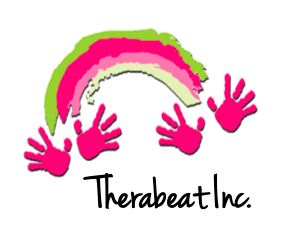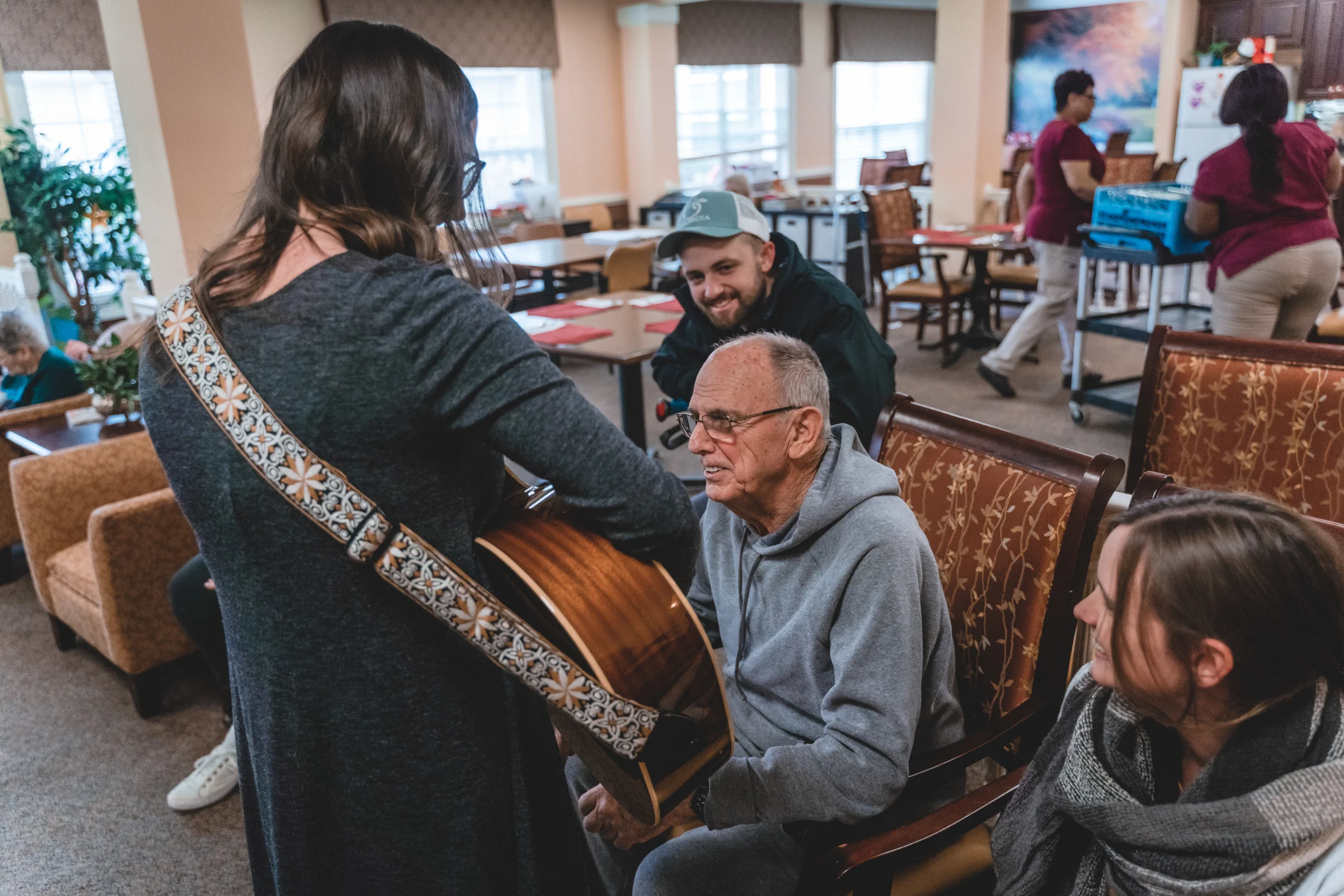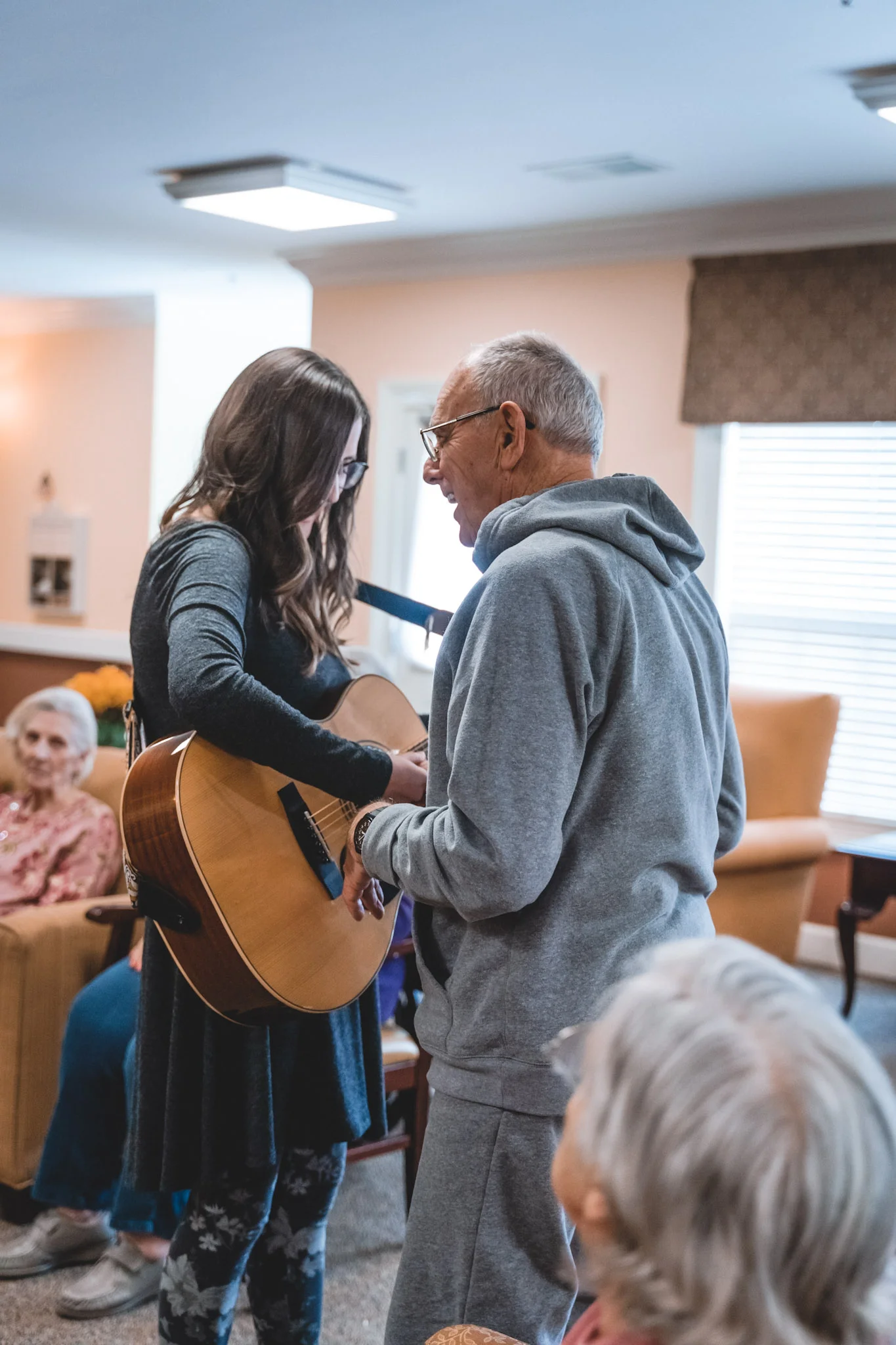BENEFITS OF GROUP MUSIC THERAPY
Group Music Therapy focuses on social skills, enhanced quality of life, movement, vocalizations & overall personal wellness.
This setting of a music therapy group is fun, allowing patients to let loose - sing, dance, and express themselves while also working on lowering anxiety and raising awareness of others.
Music therapy groups cause patients to laugh, to reminisce, to move, to sing, have elevated moods, and feel healthier!
It is sometimes more cost effective for independent living facilities to choose group music therapy sessions over individual sessions because groups cater to more people in the same amount of time.
BENEFITS OF INDIVIDUAL MUSIC THERAPY
Individual Music Therapy Sessions allow the Music Therapist to direct all of their interventions towards the individual patient’s special objectives & goals.
Sessions are based on the patient’s preferred music.
Sessions are on a routine schedule.
Patients have a more intimate and focused experience, allowing things like higher levels of response.
Since individual music therapy sessions are designed to focus directly on the patient’s needs and goals, patients reach individual goals faster in private sessions.
MUSIC THERAPY HELPS PATIENTS WITH ALZHEIMER'S, DEMENTIA, AND PARKINSON'S.
INFORMATION FOR INDEPENDENT LIVING FACILITIES
Our services are perfect additions to the programs you already have set in place for your residents.
We offer a choir, hand bell ensemble, Orff ensemble, and many other music groups. We also assist with performances in the community as well as within the facility. Practicing for a performance has proven to encourage and promote success and a sense of belonging to a group. This will help residents feel a place of belonging. Singing is excellent for memory care as well as maintaining the skills of their youth. Please contact us for more ideas specific to your facility. We can create a music program that is perfect to suit the needs of your residents. As music therapists, we understand the needs of each population we work with and how to develop an effective group to promote success and learning.
SCHEDULING OPTIONS
Our company offers group one hour sessions. If your facility starts with once a week and wants to try twice a week, simply discuss available times with your music therapist. One-on-one sessions are also available.
TERMS AND CONDITIONS
Expectations of Facility
The music therapist requests a location within your facility where sessions can be held on a regular basis. Familiarity and comfort are important to residents, and we want them to feel safe and know exactly where they are when attending therapy sessions. The Music Therapist requests a briefing before each session to learn of concerns or changes (medical, emotional, physical) in participating residents. The music therapist requests a phone call at least 24 hours in advance if the facility needs to cancel or reschedule a session. The Music Therapist wants all residents to feel welcomed into the session, but not feel like they have to stay. An open-door session allows residents to be more engaged because they are choosing to participate.
Expectations of Music Therapist
The facility can expect the Music Therapist to be on time or early. The facility can expect the Music Therapist to be understanding and open to suggestions. The facility can expect the Music Therapist to be respectful of each resident’s beliefs and engagement in sessions. No resident will be forced to participate. We understand that some residents will need to observe before they feel comfortable in singing and moving, but our predictable schedule will allow them to loosen up faster. The facility can expect the Music Therapist to dress professionally, be flexible in the event of a schedule change, and available by phone/email when necessary.
Pricing
*Each community will be invoiced on a monthly basis, unless otherwise specified.
MUSIC THERAPY & ALZHEIMER’S
Benefits of Music Therapy for Patients with Alzheimer’s
Patients with Alzheimer’s tend to experience memory loss, disorientation, changes in mood or behavior, and also difficulty in speech and movement. Music therapy uses multiple interventions throughout each session targeting these issues for mastery. Research shows that music therapy can potentially help patients with Alzheimer’s in the following ways:
Memory recall which contributes to reminiscence and satisfaction with life
Positive changes in mood and emotional states
Sense of control over life through successful experiences
Awareness of self and environment
Anxiety and stress reduction for older adult and caregiver
Non-pharmacological management of pain and discomfort
Stimulation which provokes interest when no other approach is effective
Structure which promotes rhythmic and continuous movement or vocal fluency as an adjunct to physical rehabilitation
Emotional intimacy when spouses and families share creative music experiences
Social interaction with caregivers and families
(List provided (by) The American Music Therapy Association, Inc http://www.musictherapy.org/assets/1/7/MT_Alzheimers_2006.pdf)
Music therapists generally get the best results with Alzheimer’s patients in individual sessions, but group sessions over a longer period of time can also be beneficial. Once the time, place, and therapist become part of the patient’s predictable schedule, positive results follow.
MUSIC THERAPY & DEMENTIA
Benefits of Music Therapy for Patients with Dementia
While Alzheimer’s is the most prevalent form of Dementia, affecting 60%-80% of people with Dementia, Vascular Dementia and other forms are also common. Similarities in patients with Dementia include: memory loss, communication and language loss, decreased ability to focus attention, decreased levels of reasoning and judgment, and a decrease in visual perception. Music therapy is beneficial to patients with all forms of Dementia; these benefits include many of those listed above. Since Dementia slopes downward in progression, music therapy can assist in slowing down the progression and making it as gradual, comfortable, and dignified as possible. Keeping a consistent schedule is important for patients with differing forms of Dementia. Music has the ability to bring back memories, increase family bonding, and build new relationships for patients that otherwise might not speak to anyone. The benefits from individualized or group music therapy can be rewarding for all patients with Dementia.
MUSIC THERAPY & PARKINSON’S
Benefits of Music Therapy for Patients with Parkinson’s
The signs of Parkinson’s can range from obvious tremors to a barely noticeable tremor in the hands. Since Parkinson’s is a progressive disease, music therapy can assist in drastically slowing the process by using rhythmic music and setting goals to focus on movement rehabilitation and speech. Music therapists use rhythm and cueing for reducing rigidity, improving joint movement, coordination, initiation and balance of gait. The rhythmic elements in music can help a patient with Parkinson’s stand up and dance! Music therapy has also been used for rehabilitation of speech, respiratory issues, socialization, and enhancement of mood.
(Reference- FSU Thesis by Mary-Margaret Peyton Davis, 2010- PARKINSON‘S DISEASE: A NEUROLOGIC DESCRIPTION AND MUSIC THERAPY CLINICAL CURRICULUM)






